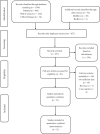Cardio-Cerebrovascular Disease is Associated With Severity and Mortality of COVID-19: A Systematic Review and Meta-Analysis
- PMID: 32851851
- PMCID: PMC7481655
- DOI: 10.1177/1099800420951984
Cardio-Cerebrovascular Disease is Associated With Severity and Mortality of COVID-19: A Systematic Review and Meta-Analysis
Abstract
At present, COVID-19 is raging all over the world. Many comorbidities, such as diabetes mellitus (OR = 2.67, 95% CI = 1.91-3.74) and hypertension (OR = 2.3, 95% CI = 1.76-3.00), have been shown to worsen the patient's condition. However, whether cardio-cerebrovascular disease will affect COVID-19 remains unclear. In this meta-analysis, we collected studies from PubMed, Wed of Science and CNKI (Chinese) to July 25, which reported COVID-19 patients with and without cardio-cerebrovascular disease as well as their severity and mortality. The random-effect model meta-analysis was used to analyze them and get overall odds ratios (OR) with 95% CIs. Funnel plots and the Begg's and Egger's test were used to assess publication bias. Thirty-one studies with 23,632 patients were finally included in the meta-analysis. The results showed an OR of 3.004 (95% CI = 2.097-4.303) for COVID-19 severity and an OR of 5.587 (95% CI = 2.810-11.112) for COVID-19 mortality. Compared with cardiovascular disease, the subgroup analysis indicated that cerebrovascular disease was more likely to increase the severity (OR = 3.400, 95% CI = 1.569-7.368) and mortality (OR = 23.477, 95% CI = 3.050-180.735) of COVID-19. Therefore, it can be inferred that cardio-cerebrovascular disease is associated with an increase in the risk of severe illness and death among COVID-19 patients. This meta-analysis showed that cardio-cerebrovascular disease has a significant relation with severe and death outcomes of COVID-19. Nurses should pay special attention to COVID-19 patients with the cardio-cerebrovascular disease.
Keywords: COVID-19; cardio-cerebrovascular disease; meta-analysis; severity; mortality.
Conflict of interest statement
Figures






Similar articles
-
The Association between Presence of Comorbidities and COVID-19 Severity: A Systematic Review and Meta-Analysis.Cerebrovasc Dis. 2021;50(2):132-140. doi: 10.1159/000513288. Epub 2021 Feb 2. Cerebrovasc Dis. 2021. PMID: 33530081 Free PMC article.
-
Impact of cerebrovascular and cardiovascular diseases on mortality and severity of COVID-19-systematic review, meta-analysis, and meta-regression.J Stroke Cerebrovasc Dis. 2020 Aug;29(8):104949. doi: 10.1016/j.jstrokecerebrovasdis.2020.104949. Epub 2020 May 14. J Stroke Cerebrovasc Dis. 2020. PMID: 32927523
-
Comorbidities' potential impacts on severe and non-severe patients with COVID-19: A systematic review and meta-analysis.Medicine (Baltimore). 2021 Mar 26;100(12):e24971. doi: 10.1097/MD.0000000000024971. Medicine (Baltimore). 2021. PMID: 33761654 Free PMC article.
-
Nervous system diseases are associated with the severity and mortality of patients with COVID-19: a systematic review and meta-analysis.Epidemiol Infect. 2021 Feb 15;149:e66. doi: 10.1017/S0950268821000376. Epidemiol Infect. 2021. PMID: 33583450 Free PMC article.
-
Impact of cerebrovascular and cardiovascular diseases on mortality and severity of COVID-19-systematic review, meta-analysis, and meta-regression.J Stroke Cerebrovasc Dis. 2020 Aug;29(8):104949. doi: 10.1016/j.jstrokecerebrovasdis.2020.104949. Epub 2020 May 14. J Stroke Cerebrovasc Dis. 2020. PMID: 32410807 Free PMC article.
Cited by
-
Cardiovascular risk factors, cardiovascular disease, and COVID-19: an umbrella review of systematic reviews.Eur Heart J Qual Care Clin Outcomes. 2021 Jul 21;7(4):330-339. doi: 10.1093/ehjqcco/qcab029. Eur Heart J Qual Care Clin Outcomes. 2021. PMID: 34107535 Free PMC article.
-
Assessment of post-COVID-19 fatigue among female survivors 2 years after hospital discharge: a nested case-control study.BMC Public Health. 2023 Dec 7;23(1):2455. doi: 10.1186/s12889-023-17382-0. BMC Public Health. 2023. PMID: 38062429 Free PMC article.
-
Association Between Previous Stroke and Severe COVID-19: A Retrospective Cohort Study and an Overall Review of Meta-Analysis.Front Neurol. 2022 Jul 12;13:922936. doi: 10.3389/fneur.2022.922936. eCollection 2022. Front Neurol. 2022. PMID: 35911884 Free PMC article.
-
Risk Factors of Severe COVID-19: A Review of Host, Viral and Environmental Factors.Viruses. 2023 Jan 7;15(1):175. doi: 10.3390/v15010175. Viruses. 2023. PMID: 36680215 Free PMC article. Review.
-
The Potential Impact of COVID-19 Virus on the Heart and the Circulatory System.Infect Drug Resist. 2022 Mar 22;15:1175-1189. doi: 10.2147/IDR.S351318. eCollection 2022. Infect Drug Resist. 2022. PMID: 35345472 Free PMC article. Review.
References
-
- Begg C. B., Mazumdar M. (1994). Operating characteristics of a rank correlation test for publication bias. Biometrics, 50(4), 1088–1101. https://www.ncbi.nlm.nih.gov/pubmed/7786990 - PubMed
-
- Buckner F. S., McCulloch D. J., Atluri V., Blain M., McGuffin S. A., Nalla A. K., Huang M. L., Greninger A. L., Jerome K. R., Cohen S. A., Neme S., Green M. L., Chu H. Y., Kim H. N. (2020). Clinical features and outcomes of 105 hospitalized patients with COVID-19 in Seattle, Washington. Clinical Infectious Diseases, 71(16), 2167–2173. 10.1093/cid/ciaa632 - DOI - PMC - PubMed
-
- Cao M., Zhang D., Wang Y., Lu Y., Zhu X., Li Y., Xue H., Lin Y., Zhang M., Sun Y., Yang Z., Shi J., Wang Y., Zhou C., Dong Y., Liu P., Dudek S., Xiao Z., Lu H., Peng L. (2020). Clinical features of patients infected with the 2019 novel coronavirus (COVID-19) in Shanghai, China. medRxiv, 2020.2003.2004.20030395. 10.1101/2020.03.04.20030395 - DOI
-
- Chen T., Wu D., Chen H., Yan W., Yang D., Chen G., Ma K., Xu D., Yu H., Wang H., Wang T., Guo W., Chen J., Ding C., Zhang X., Huang J., Han M., Li S., Luo X., Zhao J., Ning Q. (2020). Clinical characteristics of 113 deceased patients with coronavirus disease 2019: Retrospective study. BMJ, 368, m1091. 10.1136/bmj.m1091 - DOI - PMC - PubMed
Publication types
MeSH terms
LinkOut - more resources
Full Text Sources
Medical

